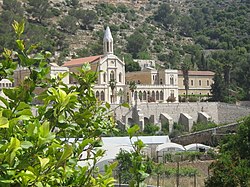Artas (village)
| Artas | |
|---|---|
| Other transcription(s) | |
| • Arabic | أرطاس |

Artas, Convent of the Hortus Conclusus
|
|
| Location of Artas within the Palestinian territories | |
| Coordinates: 31°41′21″N 35°11′10″E / 31.68917°N 35.18611°ECoordinates: 31°41′21″N 35°11′10″E / 31.68917°N 35.18611°E | |
| Palestine grid | 167/121 |
| Governorate | Bethlehem |
| Government | |
| • Type | Village council |
| • Head of Municipality | Hamdi Aish |
| Area | |
| • Jurisdiction | 4,304 dunams (4.3 km2 or 1.7 sq mi) |
| Population (2007) | |
| • Jurisdiction | 3,663 |
| Name meaning | Urtas, p.n. |
Artas (Arabic: أرطاس) is a Palestinian village located four kilometers southwest of Bethlehem in the Bethlehem Governorate in the central West Bank. According to the Palestinian Central Bureau of Statistics, the town had a population of 3,663 in 2007.
According to le Strange, the name Urtas is probably a corruption of Hortus, which has the same meaning as Firdus (Paradise), while Edward Henry Palmer thought it was a personal name. The name might also be derived from Latin hortus meaning garden, hence the name Hortus Conclusus of the nearby Catholic Convent.
Artas and the surrounding area is characterized by the diversity of landscapes, flora and fauna due to its location at a meeting place of ecosystems. From a spring below the village an aqueduct used to carry water to Birket el Hummam by Jebel el Fureidis.
According to Moshe Sharon, professor of early Islamic history at Hebrew University, two inscriptions found in the village show the great interest in Artas from leaders in the Fatimid and Mamluk states, as well as the wealth of the village at that time.
Nasir Khusraw (1004-1088) wrote that "a couple of leagues from Jerusalem is a place where there are four villages, and there is here a spring of water, with numerous gardens and orchards, and it is called Faradis (or the Paradises), on account of the beauty of the spot."
During the Crusader period, the village was known as Artasium, or Iardium Aschas. In 1227, Pope Gregory IX confirmed that the village had been given to the Church of Bethlehem. Remains of the Crusader church were torn down in the 19th century.
...
Wikipedia

